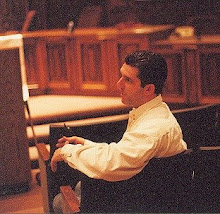Stumbling on Happiness
I learned something interesting today about the way humans perceive things. This is from the so far (I’m not finished yet) excellent book Stumbling on Happiness by Daniel Gilbert:
We agree to babysit the nephews and nieces next month, and we look forward to that obligation even as we jot it down in our diary. Then, when it actually becomes time to buy the Happy Meals, set up the Barbie playset, hide the bong, and ignore the fact that the NBA playoffs are on at one o’clock, we wonder what we were thinking when we said yes. Well, here’s what we were thinking: When we said yes we were thinking about babysitting in terms of why instead of how, in terms of causes and consequences instead of execution, and we failed to consider the fact that the detail-free babysitting we were imagining would not be the detail-laden babysitting we would ultimately experience. Babysitting next month is an “act of love”, whereas babysitting right now is an “act of lunch”, and expressing affection is spiritually rewarding in a way that buying French fries simply isn’t.
This little example is familiar to most of us, I think, but its significance was very much enhanced for me this morning. We at The Chris Jones Group are in the process of putting together our plan for the next year, and part of that plan calls for the upgrading of our systems to produce better experiences for those we’re doing loans for. Almost inevitably, what starts out as a very pleasant association turns, in the middle of the complicated and difficult details of the last couple of weeks of the loan, into something stressful and distasteful. The fact is that the mortgage process is very often highly convoluted and almost always frustrating at one point or another. It is hard work for us. Some of that work can be seen and a great deal cannot. Some of that work can be spared the client and some cannot. That there will be friction is practically inevitable.
But what the client imagines at the beginning, and in fact what we here also imagine, is the end of the deal, where the client has money and/or a new house, and we have a fat check for our trouble of getting it to them. In the end, most of the time, we have those things, and we ought therefore to be happy about them. But we frequently forget that for 99% of the time from the start to the finish, we will have none of those things. What we will have instead is a lot of work, time expended, dozens of phone calls and an inch-thick stack of paper, coupled with a growing annoyance and even concern that things are taking this long and we still have nothing to show for it. We’re working on a loan right now that has taken 19 months. We’ve been paid in that time $1000. Yes, we have a large bill outstanding. But we’re not going to get any of it if we don’t close the loan eventually. Similarly, the client wants something he doesn’t have yet, and he’s not happy about it either. In the end, I think we will all be thrilled. But right now, things are tense.
Much of life is like this. We look forward to something happening, and imagine how we will feel when it has happened. What we practically never imagine is the amount of trouble it will take to make that thing happen, and almost all the time the thing we desire cannot be obtained little by little. One does not buy a car by going to the dealer every week for a year and returning with a bumper or a headlight each time. The car comes all at once. It’s very binary – either you have a car or you don’t. Similarly, you either have the cash from the loan or you don’t. All the work you put in before that has, until you get the cash, produced nothing except headache.
But there’s a way out of this trap. Once in a while (this is so rare I didn’t even think of it until just now), we get a loan that seriously threatens not to close. In that moment, the house itself, the cash, all the things we were imagining at the beginning come back into focus, because the serious possibility exists that we will never get them. Well, then, magically, the desirability of those things rises up and eclipses the troubles we’re having now to the point that not only do we not mind our present difficulties, we are willing to endure far more of them if only, at the end, we can have the thing we originally desired. Lots of self-help gurus have discussed this, talking about “keeping the end in mind” and “focusing on the goal” and things like that, and that is precisely what we’re talking about here. The question for my business is then – how can I help?


<< Home